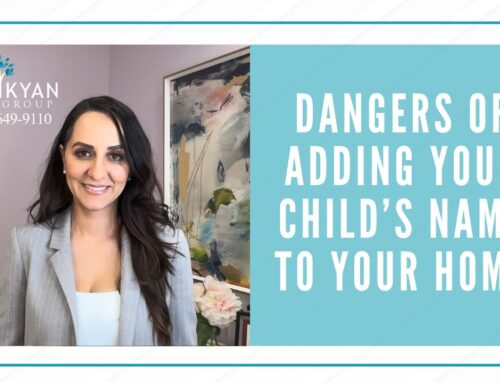What is Joint Ownership?
In previous newsletters, we have discussed a method of ownership called “joint tenancy”. Joint Tenancy essentially means 2 or more individuals owning property together in equal yet undivided shares. Every joint tenancy includes a “right of survivorship”. Which means if one joint tenant passes away, that deceased joint tenants share automatically will belong to the other tenant(s).
Example
John adds his son, Sam as an owner on his property as “joint tenants.” This means that if John passes away, the property would be 100% Sam’s by operating of law without the need for probate.
The right of survivorship is appealing in selecting to hold assets as joint tenants, however, joint ownership can also cause unintended consequences and complications. And it’s worth considering some of these, before deciding that joint ownership is the best way to pass on assets at death.
Common Problems That Can Arise
The other owner’s debts become your problem.
Any debt or obligation incurred by the other owner could affect you. If the joint owner files bankruptcy, has a tax lien, or has a judgment against them, it could cause you to end up with a new co-owner – your old co-owner’s creditors!
Example
John adds his son Sam to the deed on his home. Sam enters into some deals that go south and has debts he owes. This means that John’s home could be the subject of that debt collection. All of a sudden, John’s home is at risk because of Sam’s debts.
Your property could end up belonging to someone you don’t intend.
Some of the most difficult situations come from blended families and accidental disinheritances as we have discussed in the past.
Example

John owns a home. He meets Sally and they get married. Sally moves into the house. He adds Sally’s name on the deed together as joint tenants. John and Sally have not done any estate planning. John dies in 2014. Because they held the property in joint tenancy, Sally ends up inheriting the property by operation of law. John’s children from a previous marriage do not receive any portion of John’s estate. A few years later, Sally dies in 2016, with no estate plan. Her children, probate their mother’s estate and through the laws of intestacy her children end up inheriting the property. John’s children do not receive any portion of the property. They have been accidentally disinherited with no recourse. This is a result that John did not intend when he added Sally to the property as joint tenants.
You could accidentally disinherit family members.
If you designate someone as a joint owner and you die, you can’t control what she does with your property after your death.
Example
John adds his son Sam to the property as joint tenants instead of creating an estate plan. Sam agrees that the property is to be shared with his sister Samantha. John dies, and now Sam is the sole owner and has decided not to share with his sister. Samantha has been accidentally disinherited with no recourse.
You could have difficulty selling or refinancing your home.
All joint owners must sign off on a property sale. Depending on whether the other joint owners agree, you could end up at a standstill from the sales perspective. That is unless you’re willing to take the joint owner to court to force a sale of the property.
And what if your co-owner somehow becomes incapacitated, through accident or illness? In that case, you may have to petition a court to appoint a guardian or conservator to represent the co-owner’s interest in the sale. While you and your co-owner always worked together, an appointed guardian may see his responsibility as protecting the other owner’s interest–which might mean going against you.
You might trigger unnecessary capital gains taxes.
When a property is sold for more than the purchase price, you usually pay capital gains taxes–based on the increase in value. When a parent adds a child as joint tenant on property as a way of passing property without a need for probate, they may be triggering unnecessary capital gains taxes.
Example
John adds Sam as a joint owner on his property and John passes away 20 years later. There is no probate or trust administration, so the family saves on legal fees (let’s assume they save $5,000- $10,000) by not having an estate plan and then subsequently having to administer it.
Sam decides it is time to sell his dad’s property. Sam will likely incur a huge capital gains tax bill. If he sells the property for $550,000 following his dad’s death, but he was placed on the deed when the property was worth $50,000, Sam will have a hefty capital gains bill to pay when he goes to sell the property. So although they saved a couple of thousand dollars by not creating an estate plan and just adding Sam to the property as joint tenant, John has actually created a huge capital gains bill and headache for Sam in the hundreds of thousands.
On the other hand, heirs only pay capital gains taxes based on the increase in value from when they inherited the asset, not from the day you first acquired it. So, inheriting a property (rather than jointly owning it) could save your heirs a fortune in income tax. Instead of adding Sam as a joint owner, had John created an estate plan allowing Sam to inherit the property at his death, Sam would be able to use the value of the property at his dad’s death as his basis when calculating capital gains taxes.
Let’s play it out with numbers. At the time John’s death, the property was worth $500,000 and when Sam sold it a year later it was worth $550,000, so Sam’s gain was only $50,000.
So what can you do?
These decisions are too important and complex to be left to chance. Our team can assist you in planning to reduce estate taxes, avoid potential legal pitfalls, and set up a trust to protect your loved ones. We understand not only the legal issues but the complex layers of relationships involved in estate planning.
We’ll listen to your concerns and help you develop a plan that gives you peace of mind while achieving all of your goals you have for your family. Contact us today for a consultation, (818) 649-9110.





You must be logged in to post a comment.